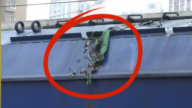【新唐人2011年9月8日讯】为了压抑通胀,中共政府采取了收紧信贷政策,致使大陆不少民企借贷无门,越来越多的小商企业转向黑市,或以打白条形式借贷度日。外界估计,下半年中国将有40%中小企半停产、停产甚至倒闭。而有钱的企业反而用高利贷放债来取代做生意。有专家表示,中国正面临着新的经济灾难。请看报导。
大陆股票交易所的申报文件显示,40家上市公司在今年1——8月份,总共发放“委托贷款”80亿元人民币,其中有企业收取的利息高达24.5%,相当于1年期基准贷款利率的近四倍。其中一家企业今年上半年的盈利,85%是来自放债的收入。
山东省纺织器材厂栾经理表示,他的企业也是需要贷款维持。
栾经理(山东省纺织器材厂):“需要资金这块,就得向村里亲戚朋友啦贷款!”
据了解,在中国,企业之间被严格禁止直接拆借资金。不过企业可以透过银行,向指定借款人发放“委托贷款”。贷款利率由委托方决定。银行则充当中介人收取手续费。
美国《华尔街日报》报导,“香溢融通控股集团股份有限公司”(Sunny Loan Top Co.)业绩报告显示,今年1-6月份发放“委托贷款”,实现人民币5550万元利润,占上半年净利润的85%。
此外,今年2月,“武汉健民药业集团股份有限公司”(Wuhan Jianmin Pharmaceutical Groups Co.)以20%的年利率,向一家酒店运营商发放了人民币1.5亿元的“委托贷款”,交易利润约占上半年净利润的三分之一。
经济学家草庵居士:“由于中共官方企业的垄断,造成大量的国有企业和一些大型企业的收入多,有很多现金,他们就可以不用花任何力气,就可以以贷款的形式,地下资金的流转,来去解决中小企业的帐(借贷),这样他们也能够盈利。就造成目前的状况。”
经济学家草庵居士指出,中共当局2008年放出了4万亿的经济发展基金。在09年的时候,又增加了9万亿贷款,由于现金投放过度,造成通货膨胀。为了抑制通货膨胀,稳定物价,中共政府就开始收缩货币。
浙江省温州中小企业协会会长周德文,对《华尔街日报》和香港的《文汇报》表示,越来越多小商企转向黑市或以打白条形式借贷度日。他估计,如果政府不协助中小企渡过难关,下半年,中国的中小企业将有40%停产甚至倒闭。
草庵居士:“企业本来是靠贷款进行的,整个中小企业,尤其是私营企业就得不到贷款支持。刚刚有点贷款,现在马上间就收缩造成这些企业没办法维持下去。”
8月29号,温州耐当劳鞋材有限公司停工,众多手拿欠条的供应商在厂区聚集。
草庵居士表示,这是中国大陆经济走向危险境地的一个信号。
英国《金融时报》评论说,每次信贷管制,企业处于“不借高利贷等死、借高利贷找死”的绝境之中。中小企业是直接的、永远的受害者。
新唐人记者唐睿、柏妮采访报导。
===
Usury Destroys SME in China
In order to control inflation, the Chinese Communist Party
(CCP) increased control on lending,
resulting in many small business unable to obtain any loans.
More and more small businesses turned to the black market.
According to an estimate, there will be 40% of mid to small
businesses slowing production, stopping production,
or even going bankrupt.
Rich corporations earn money from giving high interest loans
instead of doing everyday business.
Experts say China is facing a new round of economic crisis.
Mainland China’s stock exchange filing shows,
from Jan. to Aug. 2011,
40 listed companies gave out 8 billion yuan
in entrusted loans.
This included corporations’ interest as high as 24.5%,
equivalent to 4 times the annual benchmark loan rate.
One corporation’s half yearly profit relies on
85% of loan interest.
Shandong Textile Equipment Factory director Mr Luan said,
his company can only survive on loans.
Mr. Luan: “we need loans from friends and
relatives from the village."
In China, direct lending of funds between enterprises
is strictly prohibited.
However, corporations can sign out entrusted loans
to borrowers through the bank.
Interest rates are determined by the commissioning party.
Banks act as intermediaries.
According to The Wall Street Journal, Sunny Loan Top Co.’s
performance report shows, from January to June 2011,
the entrusted loans accounts for 55.5 million Yuan profit.
It also accounts for 85% of its first 2 quarters.
In February 2011, Wuhan Jianmin Pharmaceutical Groups
signed 150 million Yuan of entrusted loans
at an interest rate of 20% to a hotel operator.
This accounted for a third of its first 2 quarters’ net profit.
Economist Cao’an Jushi:
“Due to the monopoly of CCP state owned companies,
it causes many state-run and big corporations to have
high income and cash flow,
through the use of signing entrusted loans.
They can easily move cash around underground,
to solve mid to small business (loans), this way,
they also profit. This is the current situation.
Economist Cao’an Jushi pointed out that the CCP put in
4 trillion yuan into the economic stimulus plan in 2008.
In 2009, they contributed another 9 trillion yuan in loans,
excessive cash put into the economy causing inflation.
Now to control inflation, the CCP has started to decrease
the cash available in the economy.
The president of Association of SMEs in Wenzhou,
Zhejiang Province, Zhou Dewen, said to Wall Street Journal
and Hong Kong’s Wen Wei Po that
more and more small businesses turned to the black market,
or are surviving via IOUs.
He estimates, if the government doesn’t help the mid-to-small
business through hard times,
there will be 40% of Chinese mid-to-small business
either halting production or going bankrupt.
Cao’an Jushi: “Corporations run on loans, for mid-to-small
businesses, especially privately owned businesses.
Not being able to obtain loans, from releasing more loans to
suddenly restricting loans, make those businesses hard to run."
On Aug. 29, Wenzhou Shoe Material Co. Ltd stopped
production, suppliers holding IOUs gathered at the factory.
Cao’an Jushi said, this is a sign that Mainland China’s
economy is heading towards danger.
UK’s Financial Times commented, with every credit control,
businesses are trapped in a death situation,
“loaned usury is to die a death by sharks".
Mid-to-small businesses are always the direct victims.
NTD reporters Tang Rui and Bo Ni.




























